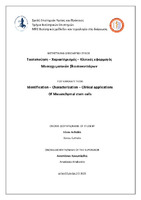Ταυτοποίηση – Χαρακτηρισμός – Κλινικές εφαρμογές Μεσεγχυματικών βλαστοκυττάρων
Identification – Characterization – Clinical applications Of Mesenchymal stem cells

Μεταπτυχιακή διπλωματική εργασία
Συγγραφέας
Ξένου, Ευθαλία
Ημερομηνία
2023-09-25Επιβλέπων
Kriebardis, AnastasiosΛέξεις-κλειδιά
Μεσεγχυματικά βλαστικά κύτταρα ; Τυποποιημένα πρωτόκολλα ; Κλινικές μελέτες ; Θεραπευτικές εφαρμογές ; Εξωσώματα ; Αναγεννητική ιατρικήΠερίληψη
Αρχές δεκαετίας του 1960 ο McCuloch και ο Till στο Ινστιτούτο καρκίνου του Οντάριο στο
Τορόντο παρατήρησαν ανάπτυξη αποικιών στον σπλήνα ακτινοβολημένων ποντικιών
ανακαλύπτοντας την ύπαρξη πολυδύναμων βλαστικών κυττάρων. Αργότερα το 1963 με
την βοήθεια του Andy Becker εδραιώνεται η θεωρία των Βλαστοκυττάρων και η
αναγνώριση της αυτοανανέωσης τους. Αν και αρχικά πιστεύεται ότι τα Βλαστοκύτταρα
απομονώνονται μόνο από το μυελό των οστών, αργότερα αναγνωρίζεται η ύπαρξή τους
και σε άλλους ιστούς όπως το λίπος, το ήπαρ, ο ομφάλιος λώρος, ο οδοντικός πολφός κ.α.
Τα επόμενα χρόνια καθιερώθηκε ο όρος Μεσεγχυματικά Βλαστοκύτταρα, ως τα
πολυδύναμα αρχέγονα κύτταρα με ικανότητες, γένεσης και διαφοροποίησης σε ένα
τουλάχιστο εξειδικευμένο τύπο κυττάρων, απουσία όμως ικανότητας ανασύστασης όλου
του οργάνου. Λόγω της εύκολης απομόνωσης από τους ιστούς και την ευκολία
καλλιέργειας τα Μεσεγχυματικά Βλαστοκύτταρα, καθίστανται ελκυστικά στην χρήση.
Κάποιες εφαρμογές τους είναι οι καρδιακές παθήσεις, η αναγέννηση του χόνδρου, η
επιδιόρθωση περιφερικών νεύρων, η νόσος του Crohn, η μυϊκή δυστροφία, η σκλήρυνση
κατά πλάκας κ.α. Οι έως τώρα κλινικές μελέτες υπό την χρήση των MSCs, επιδεικνύουν
θετικά αποτελέσματα, ως προς το εύρος δυνατοτήτων τους καθώς και των εφαρμογών
τους, εξαιτίας των πολυδύναμων ιδιοτήτων τους. Ωστόσο οι μηχανισμοί διαφοροποίησης,
κινητοποίησης και φιλοξενίας των MSCs οι οποίοι είναι εξαιρετικά δύσκολοι, απαιτούν
αποσαφηνίσεις και επιπλέον μελέτες κρίνονται αναγκαίες προκειμένου να πιστοποιηθεί
ο ρόλος τους στη μεταμόσχευση και την ανοσολογική απόκριση τους στις διάφορες
ασθένειες. Έτσι η συνεχιζόμενη έρευνα καθορίζεται ως επιτακτική ανάγκη, προκειμένου
να προσδιορισθούν καλύτερα οι μηχανισμοί και οι βιολογικές ιδιότητες των MSC. Η γνώση
της ποικιλομορφίας του πληθυσμού των MSC, η τυποποίηση πρωτοκόλλων παραγωγής,
οι συνθήκες κυτταροκαλλιέργειας μπορεί να επηρεάζουν τον φαινότυπο των MSC καθώς
και τις λειτουργίες αυτών, είναι ρόλοι καθοριστικής σημασίας. Τα Μεσεγχυματικά
βλαστικά κύτταρα καθίστανται ελκυστικά ως εργαλείο επιλογής στην διαχείριση και
ανάπτυξη κλινικών εφαρμογών στην αναγεννητική ιατρική.
Περίληψη
Since ancient times, concepts such as experiment, observation and study have been pillars
of knowledge and resources in the understanding and development of health data.
Diseases such as cancer, neurological diseases, autoimmune diseases, diabetes, make it
necessary to find new treatments and in order to develop them, man will be led to read
the "archetype". In the early 1960s we find McCulloch and Till at the Ontario Cancer
Institute in Toronto observing the development of colonies in the spleens of irradiated mice
after they had first received infusions of bone marrow cells, indicating the existence of
pluripotent stem cells and in the same year, to result in the clonality of these cells. Later in
1963, with the help of Andy Becker, they established the theory of stem cells and published
it in the journal Nature and their self-renewal capacity was also recognized. Although at
first you think that mesenchymal stem cells are isolated only from the bone marrow, later
their existence is also recognized in other tissues of the human body: such as this adipose
tissue, in the liver, in the umbilical cord, dental pulp and In the coming years, we will talk
about Mesenchymal stem cells, as the pluripotent stem cells with the ability of genesis and
differentiation into at least one specialized cell type, as well as that of self-renewal, but in
the absence of their ability to reconstitute the entire organ. Due to the simplicity of their
isolation from the tissues and the ease of their cultivation in plastic trays, Mesenchymal
stem cells become attractive in their daily use and attract the attention of the scientific
world, which is looking for new perspectives of clinical applications in Regenerative
Medicine. Some of which are about: Heart diseases. Regeneration of cartilage, bone,
peripheral nerve repair, Crohn's disease, Muscular dystrophy, Multiple Sclerosis Tissue
restoration but also treatments of Autoimmune Diseases, etc. The clinical studies so far
using MSCs demonstrate positive results, in terms of the range of possibilities of MSCs as
well as their applications, due to their versatile properties. However, the mechanisms of
differentiation, mobilization and hosting of MSCs, which are extremely difficult, require
clarification and additional studies are deemed necessary in order to certify their role in
transplantation and their immune response to various diseases. Thus, continued research
is determined as an imperative, in order to better define the mechanisms and biological
properties of MSCs. Knowledge of MSC population diversity, standardization of production
protocols, cell culture conditions of passage sources and cell density, which may affect MSC
xi
phenotype as well as their functions, are crucial roles. Mesenchymal stem cells are
becoming attractive as a tool of choice in the management and development of clinical
applications in Regenerative Medicine.

